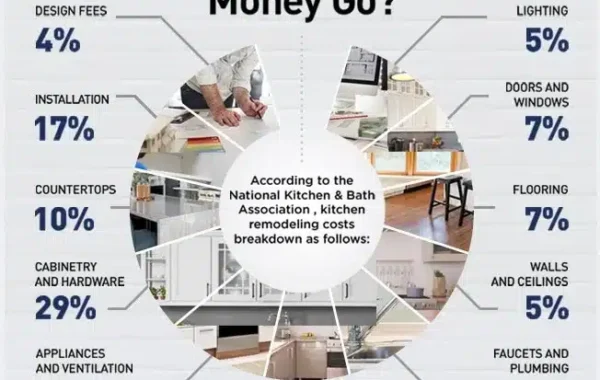The Benefits of Energy-Efficient Home Renovations in Chicago Suburbs
Chicago Suburbs homeowners are increasingly aware of the importance of energy efficiency, not just for the planet, but for their wallets too. Embarking on energy-efficient home renovations can seem daunting, but the long-term benefits are substantial, ranging from lower utility bills and increased home value to a smaller carbon footprint and enhanced comfort. Let’s delve into the compelling reasons why investing in energy-efficient upgrades is a smart move for Chicago Suburbs homeowners.
Understanding the Chicago Suburbs Climate and Its Energy Demands
Chicago Suburbs experiences a wide range of temperatures, from scorching summers to frigid winters. This drastic seasonal variation puts a significant strain on home heating and cooling systems, leading to higher energy consumption and increased utility costs. An energy-efficient home is designed to minimize this strain, reducing the need for excessive heating and cooling. This is achieved through various measures, such as improved insulation, efficient windows and doors, and high-performance HVAC systems.
The typical Chicago Suburbs homeowner faces significant energy bills annually. By reducing energy consumption, renovations can lead to substantial savings that add up over time. Investing in energy-efficient upgrades is not just about going green; it’s a financially savvy decision that pays dividends year after year.
Specific Energy-Efficient Renovations and Their Impact
Several key renovation projects can significantly boost your home’s energy efficiency. Here are some of the most impactful options for Chicago Suburbs homeowners:
1. Enhanced Insulation: A Barrier Against Temperature Extremes
Proper insulation is critical for maintaining a comfortable indoor temperature and reducing energy loss. Inadequate insulation allows heat to escape during winter and enter during summer, forcing your HVAC system to work harder and consume more energy.
Upgrading insulation in attics, walls, and basements is a foundational step in any energy-efficient renovation. Consider using materials with high R-values (a measure of thermal resistance) to maximize insulation effectiveness. Options include fiberglass, cellulose, spray foam, and rigid foam boards. Spray foam, while often more expensive, offers superior insulation and air sealing capabilities, making it a worthwhile investment for many homeowners.
2. High-Performance Windows and Doors: Sealing the Envelope
Old, drafty windows and doors are notorious for energy loss. Replacing them with energy-efficient models can make a significant difference in your home’s overall energy performance.
Look for windows with low-E coatings (which reduce heat transfer) and gas fills (such as argon or krypton) between the panes. These features help to minimize heat gain in summer and heat loss in winter. Also, ensure proper installation to prevent air leaks around the frames. Similarly, replace old doors with insulated models and seal any gaps around the door frames.
3. Efficient HVAC Systems: Smart Heating and Cooling
Heating and cooling account for a large portion of household energy consumption. Upgrading to a high-efficiency HVAC system can dramatically reduce your energy bills and improve indoor comfort.
Consider installing a high-efficiency furnace, air conditioner, or heat pump. Look for models with high AFUE (Annual Fuel Utilization Efficiency) ratings for furnaces and high SEER (Seasonal Energy Efficiency Ratio) ratings for air conditioners. A heat pump can provide both heating and cooling, making it a versatile and energy-efficient option for Chicago Suburbs’s climate. Smart thermostats can also optimize energy usage by automatically adjusting temperatures based on your schedule and preferences.
4. Solar Panel Installation: Harnessing the Power of the Sun
For homeowners looking to make a significant investment in renewable energy, solar panel installation is an excellent option. Solar panels convert sunlight into electricity, reducing your reliance on the grid and lowering your electricity bills. Chicago Suburbs offers various incentives and rebates for solar panel installations, making it an even more attractive investment.
The amount of electricity generated by solar panels depends on factors such as panel size, orientation, and sunlight availability. While Chicago Suburbs may not be as sunny as some other states, solar panels can still provide a significant portion of your home’s electricity needs. Net metering programs allow you to sell excess electricity back to the grid, further offsetting your energy costs.
5. Water Heating Efficiency: Reducing Hot Water Waste
Water heating is another significant energy consumer. Upgrading to a more efficient water heater can save you money and reduce your environmental impact.
Consider installing a tankless water heater, which heats water on demand, eliminating the need to store hot water in a tank. Tankless water heaters are more energy-efficient than traditional tank water heaters, especially for households with low hot water usage. Another option is a heat pump water heater, which uses electricity to transfer heat from the surrounding air to heat water. These are significantly more efficient than standard electric water heaters.
Financial Incentives and Rebates in Chicago Suburbs
Chicago Suburbs offers various financial incentives and rebates to encourage homeowners to invest in energy-efficient renovations. These incentives can help offset the upfront costs of these projects and make them more affordable.
Check with your local utility company and the Chicago Suburbs Department of Commerce and Economic Opportunity for information on available rebates and tax credits. The federal government also offers tax credits for certain energy-efficient upgrades. Taking advantage of these incentives can significantly reduce the overall cost of your renovation project.
Increased Home Value: A Long-Term Investment
Energy-efficient homes are increasingly desirable to homebuyers. Investing in energy-efficient renovations can increase your home’s value and make it more attractive to potential buyers when you decide to sell.
Features such as energy-efficient windows, insulation, and HVAC systems are considered valuable assets by homebuyers. A home energy audit can provide a rating for your home’s energy performance, which can be used to highlight its energy efficiency to potential buyers. In a market increasingly conscious of sustainability, an energy-efficient home holds a distinct advantage.
Environmental Benefits: Reducing Your Carbon Footprint
Beyond the financial benefits, energy-efficient home renovations contribute to a more sustainable environment. By reducing your energy consumption, you lower your carbon footprint and help to conserve natural resources.
Energy production from fossil fuels is a major contributor to greenhouse gas emissions. By reducing your reliance on fossil fuels, you help to mitigate climate change and protect the environment for future generations. Energy efficiency is a crucial component of a sustainable future, and every little bit helps.
Conclusion: A Smart Investment for Chicago Suburbs Homeowners
Energy-efficient home renovations offer a multitude of benefits for Chicago Suburbs homeowners, from lower utility bills and increased home value to a smaller carbon footprint and enhanced comfort. By investing in energy-efficient upgrades, you can save money, improve your home’s performance, and contribute to a more sustainable future. Before starting any renovation project, it’s advisable to consult with a qualified contractor to assess your home’s specific needs and determine the most effective energy-efficient solutions. Consider having a professional energy audit to pinpoint areas where your home is losing energy and receive tailored recommendations. Ready to transform your Chicago Suburbs home into an energy-efficient haven? The journey starts with informed decisions and proactive planning.

